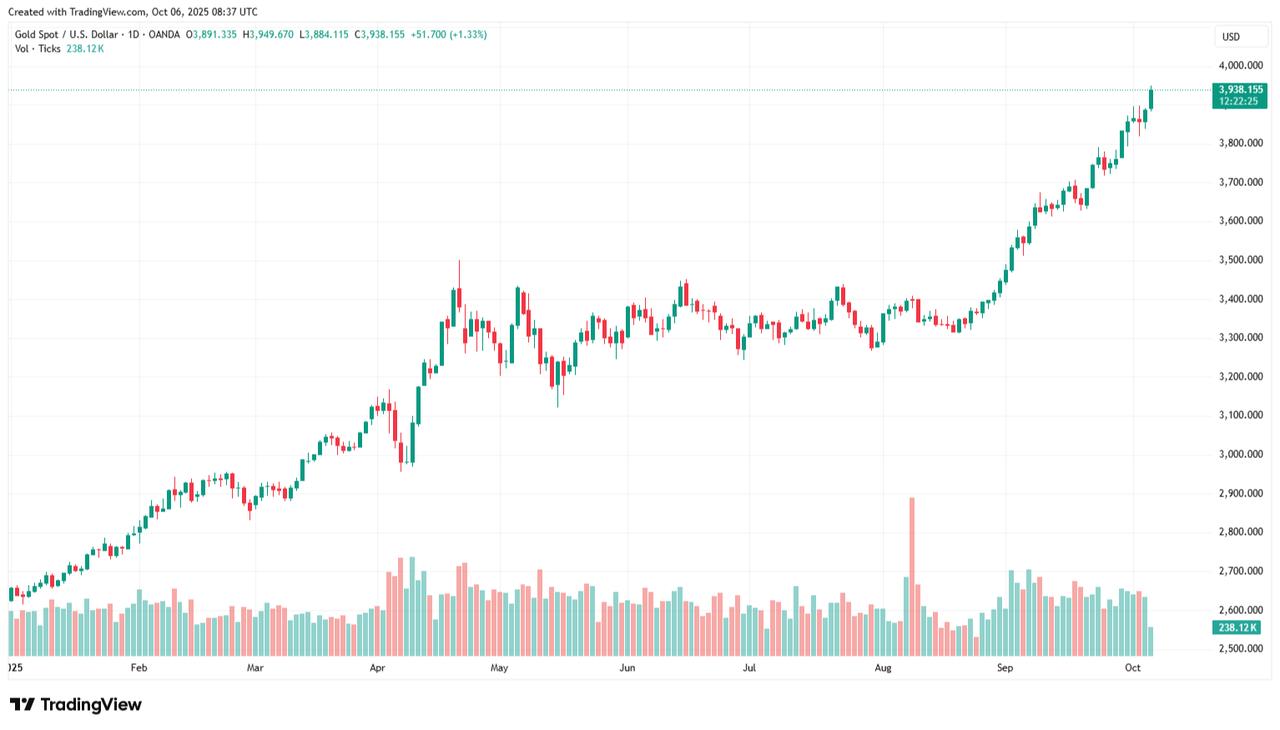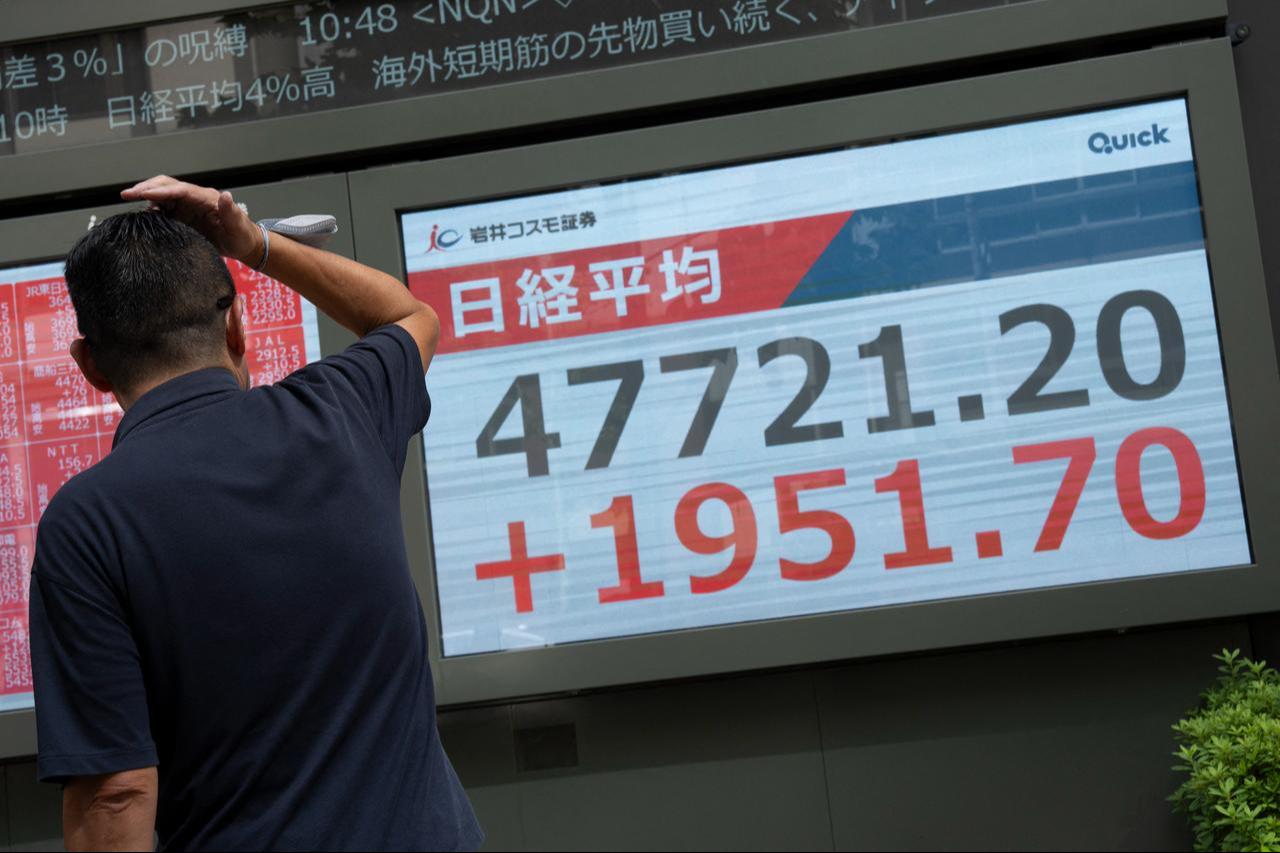
Gold rose 1.5% on Monday to a record $3,949.25 per ounce as of 8 a.m. GMT, nearing the $4,000 mark, as Japanese stocks hit an all-time high on dovish signals from the leadership change in the ruling party, while European stocks fell following French Prime Minister Sebastien Lecornu’s resignation.
The surge in gold has been dramatic, with the metal climbing more than 50% since the start of 2025, when it traded at $2,658.23, driven by political instability, the U.S. government shutdown, expectations of monetary easing by the Federal Reserve, and consistent demand from central banks.
The precious metal’s role as a safe-haven asset has been reinforced by investors seeking stability amid turbulence across major economies.
The most recent driver of gold’s upward trend has been the shutdown of the U.S. federal government, which has disrupted key services. Many federal employees have been furloughed or required to work without pay until a budget deal is reached. Each agency has drawn up its own contingency plan to determine essential workers.
The shutdown has also delayed the release of important data, including non-farm payrolls, jobless claims, and inflation figures, after the Bureau of Labor Statistics confirmed that reports would be suspended during the closure. The lack of transparency in economic indicators is complicating financial market expectations.
On the other hand, the Federal Reserve’s latest 25-basis-point rate cut in September, pushed through last week under pressure from U.S. President Donald Trump, added further momentum to gold. Markets now fully anticipate additional cuts at the Fed’s October and December meetings, according to the CME WatchTool.

Meanwhile, Japan's Nikkei 225 index closed up 4.8% at a record 47,944.76 points on Monday, fueled by optimism after Sanae Takaichi won the leadership contest for the Liberal Democratic Party, which positions her to become Japan’s first female prime minister.
Takaichi is widely regarded as dovish, supporting expansive fiscal spending and continued monetary stimulus. Investors responded with heavy buying, betting that her policies would usher in a new period of growth-supportive measures.
At the same time, the yen fell sharply, losing 1.6% to trade beyond the 150 per dollar threshold. Against the euro, the currency weakened to a record low of 176.25.
Short-term Japanese government bond yields retreated to two-week lows, reflecting reduced expectations that the Bank of Japan would resume interest rate hikes. Forecasts for a rate hike dropped from 68% on Friday to 41% by Monday.

European equity markets moved lower on Monday amid a government crisis in France, where Prime Minister Sebastien Lecornu stepped down.
The Stoxx Europe 600 fell 0.4% to 568.3 points, Germany’s DAX 40 slid 0.3% to 24,320 points, and London’s FTSE 100 eased 0.2% to 9,473 points. Italy’s FTSE MIB declined 0.6% to 43,010 points, Spain’s IBEX 35 lost 0.4% to 15,533 points, and France’s CAC 40 dropped 1.7% to 7,943 points.
Lecornu, appointed on Sept. 9 after Francois Bayrou’s government failed to secure a confidence vote, resigned only hours after taking office. His abrupt departure deepened concerns about fiscal policy and raised doubts over the government’s ability to implement reforms.
Reflecting those concerns, France’s 30-year government bond yield rose to 4.44%, its highest level in a month, before settling with a 10-basis-point increase at 4.43%.
Beyond domestic politics, investors in Europe remain cautious due to broader geopolitical risks. Russian airspace violations in recent weeks, ongoing developments in the war in Ukraine, and the possibility of new sanctions have all added to instability.
Attention is also turning to monetary policy signals from key central bankers. European Central Bank President Christine Lagarde is scheduled to speak before the European Parliament’s Economic and Monetary Affairs Committee in Strasbourg, while Bank of England Governor Andrew Bailey will deliver remarks at the Global Investment Summit in Scotland.